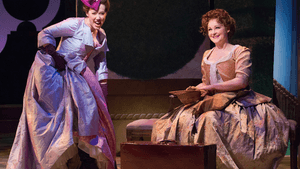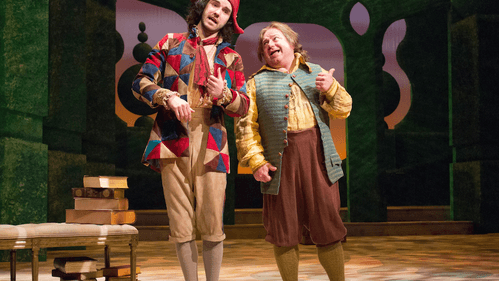Stay in the Loop
BSR publishes on a weekly schedule, with an email newsletter every Wednesday and Thursday morning. There’s no paywall, and subscribing is always free.
Not quite a triumph
Bristol Riverside Theater presents 'The Triumph of Love'

Marivaux meets musical comedy in The Triumph of Love, now onstage at Bristol Riverside Theatre. But unlike the happy union that caps the proceedings, the overall marriage is hardly serendipitous.
Considered one of the fathers of French comedy, Marivaux wrote The Triumph of Love for Paris’s Théâtre Italien in 1732, blending Enlightenment philosophy and commedia dell’arte tropes. That juxtaposition of high and low culture lends itself particularly well to musical theater, but the creators of this 1997 adaptation — librettist James Magruder, composer Jeffrey Stock, and lyricist Susan Birkenhead — struggle to balance the variously silly and serious elements that make Marivaux’s source text such an enjoyable romp.
Hijinks and heart-tugs?
The main problems arise in their handling of the primary plot, which follows Léonide (Alex Keiper), the princess of Sparta. After falling in love with nobleman Agis (Jake Delaney) on sight, she disguises herself as a scholar to gain access to the garden where he lives with his aunt and uncle, Hesione and Hermocrates (Joy Franz and Carl Wallnau). The couple are dedicated philosophers who long ago renounced the physical world.
Unbeknownst to Léonide, Agis is the true ruler of Sparta; his royal parents were conquered and killed by Léonide’s relatives decades before. His tutelage in geometry and logic has been tempered with the goal of one day regaining his throne — by any means necessary.
Dressed as Phocion the student, Léonide seduces Hesione, who seems all too eager to reacquaint herself with pleasures of the flesh. Hermocrates sniffs her out instantly as a member of “the unfortunate sex,” so she naturally puts the moves on him too. And to Agis, she becomes humble and mistreated Cecile, on the run from an unwanted arranged marriage. The entire family falls in love with her.
This scenario allows for hijinks and heart-tugging romance. Or, at least, it should. Unfortunately, Magruder’s book elides nearly all Marivaux’s delicious humor and poetry, replacing them with simple set-ups for Stock’s mostly forgettable songs.

The musical language tends toward syrupy anthemic ballads, with Birkenhead’s lyrics more concerned with rhyme than wit. The interminable first act sputters from one similar tune to another, and despite lush playing from the orchestra (conducted by Douglass G. Lutz), there’s hardly an earworm to be heard.
Comic relief
It helps little that vocal problems plague the central quartet. Keiper proves her mettle as a comic actress, but musically, she only sounds secure when adopting a parlando style of singing. Franz, a veteran of Sondheim and Schwartz on Broadway, once possessed a penetratingly beautiful voice, but the days when she could do justice to a role like Hesione are long gone. When Keiper and Franz come together for the first-act duet “You May Call Me Phocion,” any correct pitches seem purely accidental.
Hermocrates doesn’t require a great singer, but Wallnau seems uncomfortable even with a Sprechstimme type of delivery. Still, he fares better than Delaney, who pushes his limited resources to the breaking point, often turning inaudible despite the production’s general overamplification.
The musical only comes alive when its comic relief takes center stage. All praises to Rebecca Robbins, who lights up the production as Corine, Léonide’s lady-in-waiting, and sings the rest of the cast off the stage. She’s ready to headline a show of her own, pairing wonderfully with Adam Hoyak’s loose-limbed Harlequin (costumed to clownish perfection by Lisa Zinni) and Danny Rutigliano’s Dimas, a surly blend of Borscht Belt schtick and French grand style.
Director Keith Baker has a knack for staging the Commedia numbers with visual panache and real humor; his clowns chew holes all over Roman Tatarowicz’s lushly verdant set. Regrettably, this only reinforces the turgidity of the central story.
That shouldn’t be the case. Marivaux endures because he unified charm and pathos, intellect and amusement. His adaptors never strike that balance, which assures no production can be entirely successful.
What, When, Where
The Triumph of Love. By James Magruder, Jeffrey Stock, and Susan Birkenhead; Keith Baker directed. Through May 20, 2018, at Bristol Riverside Theatre, 120 Radcliffe Street, Bristol, Pennsylvania. (215) 785-0100 or brtstage.org.
Sign up for our newsletter
All of the week's new articles, all in one place. Sign up for the free weekly BSR newsletters, and don't miss a conversation.

 Cameron Kelsall
Cameron Kelsall